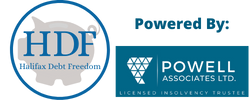Get Help With Debt

Being in debt can feel like you’re drowning. It becomes difficult to see a way out, and it gets harder and harder to ask for help with debt. If you’re struggling with debt and are finding that you can barely keep your head above water, don’t worry – debt help is available. Despite how it may feel, you can get help with debt.
Here are some simple steps that you can take today to get your debt under control:
1. Calculate Your Total Debt
When debt starts piling up, sometimes the knee jerk reaction is to bury your head in the sand and to stop keeping track of how much you owe. This, of course, only makes the problem worse, so the first step is to add up all of your debt. It may be overwhelming to begin with, but it’s an important first step to take.
Make a list of everyone you owe money to and how much. This might include household bills, mortgage or rent, credit card repayments, money owed to family and friends, and any other personal or payday loans you have. It’s a good idea to jot down beside each payment how often you need to pay it, when the next payment is due, and whether you have fallen behind on any.
Having everything you owe accounted for will make it much easier to get help with debt, as you will have a clear picture of what your total outgoings are, compared to your income. Start opening your bills straight away and filing them away in a safe place so nothing gets misplaced. Avoiding your debts only adds to the stress.
2. Categorize Your Debts By Priority
Now that you have a clear idea of how much you owe, the next step is to prioritize your debts.
When it comes to understanding your debt options, it’s key that you know which payments are the highest priority. Paying off debts in the correct order will help you to avoid getting into further debt. There could be larger consequences for missing a payment to a debt collection agency, for example, than a small payday loan.
The same goes for how many payments you’ve missed. If you’ve missed several payments on your rent, then you could risk eviction, making this a high-priority issue. If you’ve only missed one payment, on the other hand, then this might not be as urgent as some other debts on your list.
Work through your debts and categorise them into high priority, mid priority, and low priority debts. High priority debts should include any urgent debts with serious consequences, like getting your electricity or gas turned off, having your home or other items repossessed, or receiving a court summons or eviction notice. If you’re experiencing any of these high priority debt issues, it’s time for you to get debt help.
3. Create A Realistic Budget
If you’ve completed steps one and two, you’re already on your way to taking back control of your finances. Now that you have a clear picture of exactly what you owe and which debts need to be tackled immediately, the next step is to set yourself a budget.
Having a realistic budget is the best way to keep on top of your finances. Learning to understand what you take in, what you owe, and what is left to live on is crucial. If budgeting is new to you, seek financial debt help from a friend or family member or from an organization that offers debt advice.
When creating your budget, it’s important to keep track of every outgoing you have. It’s often easy to take out cash at the start of the month and lose track of how much you’re actually spending on miscellaneous purchases.
Divide your budget into categories to make it easier to see where you can cut down on spending and make savings. The categories should reflect your lifestyle, but common examples include household bills, debt repayments, transport costs, loan repayments, mortgage or rent, leisure, and miscellaneous living costs.
Create a budget for each month –taking into account any additional one-off outgoings you might have that month– and check it regularly to make sure you are sticking to it.
Look for easy ways to cut down spending by swapping that Starbucks coffee for a homemade brew, switching to supermarket own-brand groceries, and using public transport when possible. You can even contact your electricity and gas providers to see if they can offer you a better deal or switch providers to make the most of cheaper deals.
Learning how to budget will help you to cut costs and reduce your debts.
Source: https://pixabay.com/illustrations/piggy-bank-money-finance-banking-2889042/
4. Boost Your Income
Once you’ve calculated your outgoings and where you can make some savings, consider ways to boost your income to pay off a larger chunk of debt.
One of the best ways to help pay debt is to find a way to increase your earnings while reducing your spending. Finding a part-time job could provide some extra cash to pay off your debts, providing that your earnings are small and you don’t end up paying too much tax on your second income.
Every little helps, so get creative: sell off unwanted clothes, toys, and gadgets and put the money towards clearing debts.
Another way to increase your earnings is to find out if there are any benefits, grants, tax breaks, or money-saving schemes that you are eligible to apply for. Speak to your local non-profit organization to find out more about what financial aid you could be entitled to.
5. Contact Your Creditors
Freeing yourself from debt often involves asking for help. This can be difficult, but keep your end goal in mind: getting back in control of your finances.
Take a look through your priority list and consider contacting creditors from the priority and low priority categories to ask for help for debt. While creditors are not often known for their leniency, it’s always worth speaking to them directly and seeing if they can offer any debt relief.
The amount of support a creditor will offer depends on the circumstances, such as:
- The amount of money you owe
- If you have missed repayments, and how many
- If there are specific circumstances that explain why you are requesting extra support
- The creditor’s evaluation of your ability to make your repayments
- The type of payment or debt you are requesting extra support for (eg. if it’s a credit agreement or a bill)
In some circumstances with low priority debts, your creditor may be able to offer help in debt if you have proven yourself as a reliable lender (who has gotten into arrears due to unfortunate circumstances), or if you have shown that you are taking steps to get out of debt, such as selling off assets.
While it’s not a guarantee, contacting your creditor is worth a shot to regain financial freedom. In some extreme circumstances, where the borrower can prove that their financial situation isn’t likely to improve (for example, due to health reasons), debt can even be wiped. This is why it’s key to speak with creditors to know where you stand.
6. Get Professional Advice
Finding an organization that can offer you professional advice will give you peace of mind and remind you that you’re not alone.
There are a number of organizations that offer debt help on online platforms and in-person. Speaking to a stranger, without fear of judgment, can help you to gain some perspective on the situation.
Professionals who offer debt help are especially important if you’re in serious debt and require a debt repayment plan or need to file for bankruptcy. Experienced professionals will be able to walk you through your options and make the best decision for your personal circumstances.
There are legal debt relief programs, providing interest reduction, and debt repayment plans to help those in debt get back on their feet. Professional debt advisors can let you know if you qualify for any of these programs, which can offer a quicker path out of debt.
Your debt advisor deals with people in similar situations to yours every day, and can offer you advice without judgment, and always 100% confidential.
There are plenty of options when it comes to sorting out your debts, and your debt advisor will suggest the best debt options for you and make sure that you’re receiving all the benefits and other aids that you’re entitled to. Most importantly, when you ask for help with debt from a professional, you’ll know you are no longer alone.
Key Takeaways
Dealing with debt can be stressful, but you don’t have to go through it alone. You can begin the process of freeing yourself from debt today by taking the small, manageable steps laid out in this guide.
A debt relief expert can walk you through the process and help you to understand the debt options that are available to you. They can draw up the best solution for your personal circumstances, offer advice on budgeting, and simply provide a listening ear when things get overwhelming. Debt doesn’t have to control your life. Take the first step today – tomorrow is one step closer to a debt-free future.
This article was written by David Moffatt. A Debt Relief Expert. He has helped assist in creating plans that have helped save Nova Scotia residents over $30 million dollars of consumer and tax debt since 2015. We believe that no consumer should have to struggle with the stress of overwhelming debt. Our debt restructuring strategies can help you cut your debt by up to 80%.
If you are struggling with debt please reach out. It hurts to continue to suffer financially. Halifax Debt Freedom services Halifax, Dartmouth, Bedford, Sackville the entirety of HRM, and all of Nova Scotia.


